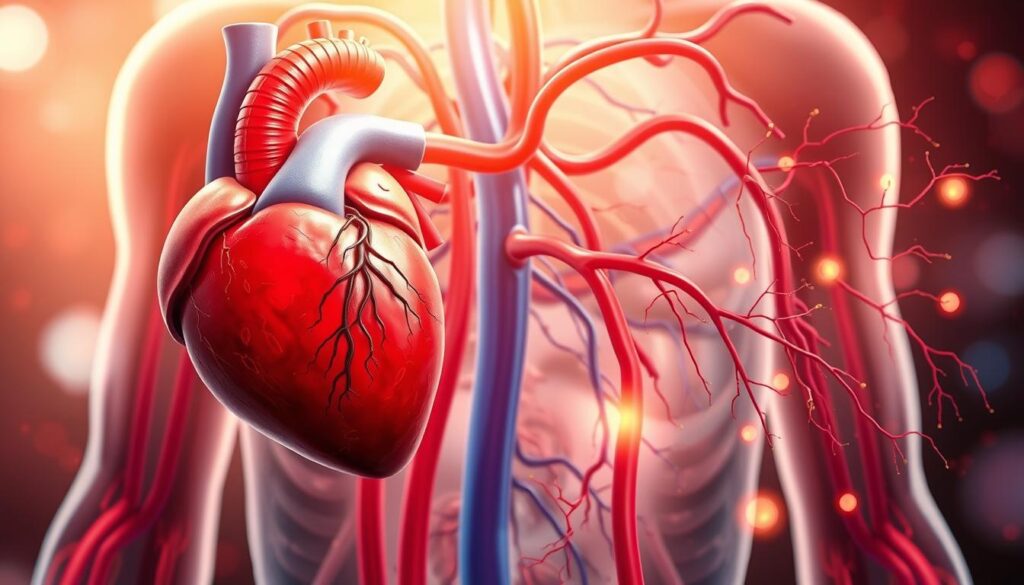Maintaining cardiovascular health is crucial for overall well-being, and recent findings suggest that vitamin C plays a significant role in this regard.
Research has demonstrated that antioxidant properties of vitamin C can help prevent heart disease by reducing the risk of atherosclerosis, hypertension, and stroke.
By incorporating vitamin C into one’s diet, individuals can potentially improve their cardiovascular health and reduce the risk of related complications.
Table of Contents
Key Takeaways
- Vitamin C is essential for maintaining cardiovascular health.
- The antioxidant properties of vitamin C help prevent heart disease.
- A diet rich in vitamin C can reduce the risk of atherosclerosis and hypertension.
- Incorporating vitamin C into your diet can improve overall cardiovascular well-being.
- Vitamin C has been shown to reduce the risk of stroke.
What is Vitamin C and Why It Matters for Overall Health
Understanding Vitamin C’s role in the body can reveal its significance in maintaining health. Vitamin C, or ascorbic acid, is a water-soluble vitamin that is crucial for various bodily functions. It’s not just about fighting off the common cold; Vitamin C is essential for overall well-being.
The Essential Role of Vitamin C in the Body
Vitamin C is involved in numerous physiological processes. It plays a critical role in the biosynthesis of carnitine, collagen, and catecholamines. Additionally, Vitamin C improves iron absorption, which is vital for healthy red blood cells. Its antioxidant properties help protect cells from damage caused by free radicals.
| Function | Description |
|---|---|
| Biosynthesis of Carnitine | Important for energy production in cells |
| Collagen Synthesis | Crucial for healthy skin, bones, and connective tissue |
| Catecholamine Production | Essential for nerve function and hormone production |
Beyond Immune Support: Lesser-Known Functions
Beyond its well-known immune-boosting properties, Vitamin C has several lesser-known functions. It acts as an antioxidant, neutralizing free radicals that can cause oxidative stress. Vitamin C also supports cardiovascular health by helping to maintain healthy blood vessels and supporting the overall health of the heart.
“Vitamin C is one of the most powerful antioxidants, and its role in maintaining cardiovascular health cannot be overstated.”
As shown in the table above, Vitamin C’s roles are diverse and critical for maintaining overall health. Ensuring adequate intake of Vitamin C through diet or supplementation is essential for reaping its benefits.
The Science Behind Vitamin C and Heart Disease
Emerging evidence suggests that vitamin C could be a key factor in maintaining heart health and preventing disease. To understand how vitamin C impacts heart disease, it’s essential to first grasp the basics of cardiovascular disease and the mechanisms involved.
Understanding Cardiovascular Disease Basics
Cardiovascular disease encompasses conditions that affect the heart and blood vessels, often leading to heart attacks, strokes, and other serious health issues. The development of cardiovascular disease is multifactorial, involving factors such as high blood pressure, high cholesterol, smoking, and diabetes. Understanding these risk factors is crucial in preventing and managing heart disease.
- High blood pressure
- High cholesterol levels
- Smoking and tobacco use
- Diabetes and insulin resistance
How Oxidative Stress Damages the Heart
Oxidative stress occurs when there’s an imbalance between free radicals and antioxidants in the body, leading to cellular damage. In the context of heart health, oxidative stress can damage the heart muscle and blood vessels, contributing to the development of cardiovascular disease. Vitamin C, with its antioxidant properties, plays a significant role in mitigating this damage.
Vitamin C as a Powerful Antioxidant Defender
Vitamin C acts as a powerful antioxidant that neutralizes free radicals, thereby reducing oxidative stress and its harmful effects on the heart. By scavenging reactive oxygen species, vitamin C helps protect the cardiovascular system from damage. This antioxidant effect is crucial in maintaining the health and function of blood vessels and the heart.
The key benefits of vitamin C’s antioxidant properties include:
- Reducing oxidative stress
- Protecting against cellular damage
- Supporting overall heart health
Clinical Research: Evidence Supporting Vitamin C for Heart Health
The impact of vitamin C on heart health has been a subject of extensive research, with several landmark studies shedding light on its benefits. Clinical research has played a crucial role in understanding the relationship between vitamin C intake and cardiovascular health.
Landmark Studies and Their Findings
Several landmark studies have investigated the effects of vitamin C on heart health. For instance, a study published in the Journal of the American College of Cardiology found that high-dose vitamin C supplementation improved endothelial function in patients with coronary artery disease. Another significant study demonstrated that vitamin C intake was associated with a reduced risk of cardiovascular disease mortality.
- A meta-analysis of 13 clinical trials revealed that vitamin C supplementation significantly reduced blood pressure in hypertensive patients.
- A study involving over 8,000 participants found that higher vitamin C intake was associated with a lower risk of heart disease.
Recent Discoveries in Vitamin C Research
Recent research has continued to explore the potential benefits of vitamin C for heart health. A study published in the American Journal of Clinical Nutrition found that vitamin C supplementation improved cardiovascular risk factors in individuals with type 2 diabetes. Furthermore, research has suggested that vitamin C may help reduce inflammation, a key factor in the development of cardiovascular disease.
“The evidence suggests that vitamin C may have a protective effect on cardiovascular health, particularly in populations at high risk of cardiovascular disease.”
What Medical Experts Are Saying
Medical experts are increasingly recognizing the potential benefits of vitamin C for heart health. According to Dr. Mark Houston, a cardiologist and researcher, “Vitamin C is an essential nutrient that plays a critical role in maintaining cardiovascular health.” Experts recommend incorporating vitamin C-rich foods into one’s diet and considering supplementation for those at high risk of cardiovascular disease.
How Vitamin C Improves Blood Vessel Function
Vitamin C plays a crucial role in maintaining healthy blood vessels. Its benefits extend to various aspects of cardiovascular health, making it an essential nutrient for overall well-being.
Enhancing Endothelial Health
The endothelium, a thin layer of cells lining blood vessels, plays a vital role in vascular health. Vitamin C improves endothelial function by promoting the production of nitric oxide, a molecule that helps blood vessels relax and dilate. This process is crucial for maintaining healthy blood flow and preventing conditions like hypertension.
Preventing Arterial Stiffness and Plaque Formation
Arterial stiffness is a significant risk factor for cardiovascular disease. Vitamin C has been shown to reduce arterial stiffness by improving the elasticity of blood vessels. Additionally, its antioxidant properties help prevent the formation of plaque in arteries, reducing the risk of atherosclerosis.
Blood Pressure Benefits of Regular Vitamin C Intake
Regular consumption of vitamin C can have a positive impact on blood pressure levels. Studies have found that vitamin C supplementation can help lower blood pressure in individuals with hypertension. This is achieved through its effects on endothelial function and arterial stiffness.
- Vitamin C improves blood vessel function.
- It enhances endothelial health.
- Regular intake can help manage blood pressure.
Vitamin C’s Role in Reducing Inflammation and Heart Disease Risk
Vitamin C’s anti-inflammatory properties make it an essential nutrient for maintaining heart health. Chronic inflammation is a well-established risk factor for cardiovascular disease, and recent research has highlighted the potential of vitamin C in mitigating this risk.
The Dangerous Connection Between Inflammation and Heart Disease
Chronic inflammation plays a significant role in the development and progression of heart disease. It can lead to the formation of plaques in arteries, making them more susceptible to rupture, which can cause heart attacks and strokes. Inflammation is a silent threat that can be managed through dietary interventions and lifestyle changes.
How Vitamin C Fights Inflammatory Processes
Vitamin C acts as a powerful antioxidant, neutralizing free radicals that contribute to inflammation. By reducing oxidative stress, vitamin C helps to minimize the inflammatory response, thereby protecting the cardiovascular system. Studies have shown that vitamin C supplementation can lower levels of inflammatory markers, such as C-reactive protein.
Combining Vitamin C with Other Anti-inflammatory Strategies
While vitamin C is beneficial on its own, its effects can be enhanced when combined with other anti-inflammatory strategies. A diet rich in fruits, vegetables, and omega-3 fatty acids, along with regular exercise and stress management, can create a comprehensive approach to reducing inflammation and heart disease risk. A holistic approach to heart health is more effective than relying on a single nutrient or intervention.
By incorporating vitamin C into a broader anti-inflammatory strategy, individuals can significantly reduce their risk of heart disease and promote overall cardiovascular well-being.
Cholesterol Management and Vitamin C Heart Disease Benefits
The relationship between vitamin C and cholesterol management has garnered significant attention in the medical community due to its potential heart benefits. Vitamin C may play a crucial role in maintaining healthy cholesterol levels, thereby reducing the risk of heart disease.
Effects on LDL (Bad) Cholesterol Levels
Research indicates that vitamin C can help lower LDL (bad) cholesterol levels. High levels of LDL cholesterol can lead to plaque buildup in the arteries, increasing the risk of heart disease. Studies have shown that vitamin C supplementation can contribute to a reduction in LDL cholesterol, thus supporting heart health.
Impact on HDL (Good) Cholesterol Levels
In addition to lowering LDL cholesterol, vitamin C has been found to have a positive effect on HDL (good) cholesterol levels. Increasing HDL cholesterol can help remove other forms of cholesterol from the bloodstream, further reducing the risk of heart disease. Regular intake of vitamin C through diet or supplements may help boost HDL levels.
Vitamin C and Triglyceride Regulation
Vitamin C also plays a role in regulating triglycerides, a type of fat found in the blood. High triglyceride levels can increase the risk of heart disease. Research suggests that vitamin C can help manage triglyceride levels, contributing to overall heart health.
| Cholesterol Type | Effect of Vitamin C | Benefit |
|---|---|---|
| LDL (Bad) Cholesterol | Lowers levels | Reduces plaque buildup |
| HDL (Good) Cholesterol | Increases levels | Removes excess cholesterol |
| Triglycerides | Regulates levels | Reduces heart disease risk |

Optimal Vitamin C Dosage for Cardiovascular Protection
To reap the cardiovascular benefits of vitamin C, understanding the optimal dosage is essential. The amount of vitamin C required for overall health and specifically for heart health can vary based on several factors, including age, lifestyle, and existing health conditions.
Standard Recommended Daily Intake
The standard recommended daily intake of vitamin C varies by age and other factors. For adults, the Recommended Dietary Allowance (RDA) is around 90 mg for men and 75 mg for women per day. Smokers or those exposed to secondhand smoke are advised to consume an additional 35 mg per day due to the oxidative stress caused by smoking.
Therapeutic Doses for Heart Health
Some studies suggest that higher doses of vitamin C may be beneficial for heart health. Therapeutic doses can range from 500 mg to 2000 mg per day. These higher intakes are often associated with enhanced antioxidant effects and improved cardiovascular function. However, it’s crucial to consult with a healthcare provider before starting any high-dose regimen.
Signs You Might Need More Vitamin C
Certain individuals may require more vitamin C than others. Signs that you might need more vitamin C include frequent illness, poor wound healing, and easy bruising. Additionally, individuals with a diet lacking in fruits and vegetables may benefit from increased vitamin C intake.
| Group | Recommended Vitamin C Intake |
|---|---|
| Adult Men | 90 mg/day |
| Adult Women | 75 mg/day |
| Smokers | +35 mg/day |
Best Sources of Vitamin C for Heart Health
Maintaining optimal vitamin C levels is key to supporting cardiovascular health, and there are various dietary options available. Ensuring adequate intake of vitamin C through diet and, if necessary, supplementation can significantly contribute to overall heart health.
Top Vitamin C-Rich Foods to Include in Your Diet
Incorporating vitamin C-rich foods into your daily meals is an excellent way to support heart health. These foods not only provide vitamin C but are also rich in other essential nutrients.
Fruits and Vegetables with Highest Vitamin C Content
Some of the top vitamin C-rich fruits include citrus fruits like oranges and grapefruits, strawberries, and kiwis. Vegetables such as bell peppers, broccoli, and leafy greens like spinach are also high in vitamin C. Including a variety of these foods in your diet can help ensure you’re getting enough vitamin C.

Creating heart-healthy recipes that incorporate vitamin C-rich foods can be both delicious and nutritious. For example, a salad with mixed greens, sliced strawberries, and citrus segments, topped with a light vinaigrette, makes for a refreshing and vitamin C-rich meal.
Supplement Options: Types, Absorption, and Quality
For individuals who may struggle to get enough vitamin C from their diet alone, supplement options are available. Vitamin C supplements come in various forms, including tablets, capsules, and powders. When choosing a supplement, it’s crucial to consider factors like absorption rate and the quality of the product to ensure you’re getting the most benefit.
Potential Risks and Considerations When Using Vitamin C for Heart Disease
While vitamin C offers numerous benefits, it’s crucial to understand the potential risks associated with its use. Vitamin C is generally considered safe, but high doses can cause side effects, and certain individuals may need to exercise caution due to drug interactions or health conditions.
Possible Side Effects of High-Dose Vitamin C
High doses of vitamin C can cause gastrointestinal side effects, including diarrhea, stomach cramps, and nausea. In rare cases, it may also lead to kidney stones or iron overload. It’s essential to be aware of these potential side effects to avoid complications.
Drug Interactions and Contraindications
Vitamin C can interact with certain medications, such as blood thinners and chemotherapy drugs. Individuals with specific health conditions, like hemochromatosis, should also exercise caution. A healthcare professional should be consulted before starting any vitamin C supplement regimen.
| Medication | Potential Interaction with Vitamin C |
|---|---|
| Blood Thinners | Increased risk of bleeding |
| Chemotherapy Drugs | Potential reduction in chemotherapy effectiveness |
Who Should Exercise Caution with Vitamin C Supplements
Individuals with kidney disease, hemochromatosis, or those prone to kidney stones should consult their healthcare provider before taking vitamin C supplements. Pregnant or breastfeeding women should also seek medical advice to ensure safe usage.
“It’s crucial for individuals to consult with their healthcare provider before starting any supplement regimen, especially if they have underlying health conditions or are taking medications.”
Conclusion: Making Vitamin C Part of Your Heart Health Strategy
Incorporating vitamin C into your daily routine can be a simple yet effective way to support your cardiovascular well-being. By understanding the role of vitamin C in maintaining heart health, you can make informed decisions about your diet and supplement regimen.
A well-balanced diet rich in vitamin C, along with a healthy lifestyle, can contribute to a comprehensive heart health strategy. This approach may help reduce the risk of heart disease and promote overall cardiovascular health.
As you consider adding vitamin C to your heart health plan, consult with a healthcare professional to determine the best course of action for your individual needs. By doing so, you can harness the potential benefits of vitamin C to support a healthier heart and improved overall well-being.
FAQ
What is the role of vitamin C in preventing heart disease?
Vitamin C acts as an antioxidant, helping to prevent cardiovascular diseases by protecting against oxidative stress and inflammation, which are key factors in the development of heart disease.
How does vitamin C impact blood vessel function?
Vitamin C improves blood vessel function by enhancing endothelial health, preventing arterial stiffness and plaque formation, and regulating blood pressure, all of which contribute to a reduced risk of heart disease.
Can vitamin C help reduce inflammation related to heart disease?
Yes, vitamin C has anti-inflammatory properties that help reduce inflammation, a major risk factor for heart disease, thereby lowering the risk of developing cardiovascular conditions.
What is the optimal dosage of vitamin C for heart health?
The standard recommended daily intake of vitamin C is around 60-90 mg, but therapeutic doses for heart health can range from 500 mg to 2000 mg per day, depending on individual needs and health status.
Are there any potential risks or side effects associated with taking vitamin C for heart health?
High doses of vitamin C can cause gastrointestinal side effects, and individuals with certain health conditions or taking specific medications should consult their healthcare provider before taking vitamin C supplements.
What are the best dietary sources of vitamin C for heart health?
Foods rich in vitamin C include citrus fruits, strawberries, kiwis, bell peppers, and leafy greens like spinach and kale, which can be incorporated into a heart-healthy diet.
Can vitamin C supplements be used in place of a healthy diet?
While vitamin C supplements can be beneficial, they should not replace a balanced diet rich in whole foods, as a healthy diet provides a broader range of essential nutrients and fiber.
How does vitamin C affect cholesterol levels?
Vitamin C has been shown to have a positive impact on cholesterol levels by reducing LDL (bad) cholesterol and possibly increasing HDL (good) cholesterol, as well as regulating triglycerides.
Who should be cautious when taking vitamin C supplements?
Individuals with kidney disease, hemochromatosis, or those taking certain medications, such as blood thinners, should consult their healthcare provider before taking vitamin C supplements.

